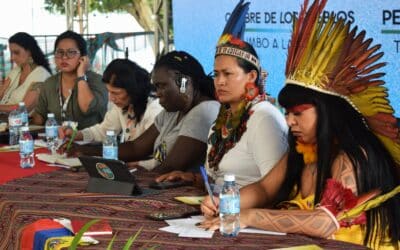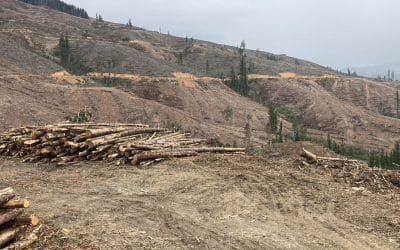By Shona Hawkes
Anyone who cares about protecting nature, biodiversity and those who defend it ultimately has a stake in stopping the trillions of dollars that are driving nature destruction and human rights abuses. However, too often, it is assumed that rights holders on the frontlines of the nature crisis do not deserve an equal seat at the table in initiatives that claim to fix the problem. Below we answer five key questions about the Taskforce on Nature-related Financial Disclosures (TNFD) and outline why you should be concerned.
Why is TNFD important?
TNFD is a voluntary initiative but it will likely serve as a blueprint from which governments will draw in writing future business regulations. Like has happened with its sister initiative on climate, the Taskforce on Climate-related Financial Disclosures. If TNFD enables greenwashing, this will detract from the real solutions needed to curb the trillions of dollars in financing that are driving the nature and biodiversity crisis and the human rights abuses that often underpin it.
What is the TNFD?
Launched in 2021, TNFD is headed by a taskforce of 34 senior staff from global companies. The TNFD is led by business but endorsed by various actors on the international stage. TNFD is developing a framework that outlines what information a company or financial institution should self-report regarding how its relationship with nature and biodiversity has, or will, impact its business. This may include how it is preparing for changes in the short, medium, or long term. TNFD launched the first draft of its framework in March 2022 and the second in June 2022. Two more drafts will come out in November 2022 and February 2023, before the final version in September 2023.
What are key concerns with its proposed framework?
In May 2022, a Joint NGO Letter to the TNFD by 28 NGOs and networks outlined major concerns with its first draft. None of these have been addressed.
There are many concerns with TNFD’s proposed framework. Key issues include:
- TNFD doesn’t require companies or financial institutions to report their known harms and adverse impacts on nature or people. TNFD only requires a business to report on significant financial risks or opportunities – in this case, those that may arise from its relationship with nature. While an ethical firm may see all harms to nature as bad for business, a company profiting off environmental abuse is less likely to. If a business is knowingly linked to environmental abuse but doesn’t think this is financially detrimental it doesn’t get reported. This is a major red flag for greenwashing.
- TNFD ignores human rights including the rights of women, Indigenous Peoples, local communities, peasants, and the very people standing up to companies, often at great risk, to safeguard nature. There is no human rights reporting requirement under TNFD. Despite TNFD receiving hundreds of thousands of dollars in funding from the UN Development Programme (UNDP) – TNFD is normalizing the idea that we can fix the nature crisis while ignoring the human rights abuses that often underpin it.
- TNFD doesn’t require a business to publish grievance lists or take similar steps to disclose where communities, NGOs, or media investigations have made allegations that it is linked to harm against nature and people. Complaints and grievances are one of the most important tools to understand if a business’ claims don’t stack up in practice.
- TNFD plans to rush out a series of guidances. These guidances will outline recommendations for sectors, financial actors, and potentially other areas. In its broader work, TNFD has often cherry-picked from approaches that set a very low bar, rather than reflect expectations set through more sound multi-stakeholder processes. Poor guidance is highly likely to set a lower bar than many existing national and international environmental and human rights standards. In doing so, TNFD will undermine the headway made, and lessons learned, over many years.
TNFD is a business reporting initiative, so it doesn’t discuss issues like how to hold businesses accountable for environmental harms or ensure redress for affected people.
What are its broader impacts?
A key concern is that TNFD is hijacking the broader conversation about how to stop the trillions of dollars in financing that is driving, and profiting from, the destruction of nature and human rights abuses. It is far removed from the solutions that the victims of corporate abuse and harm to nature are calling for.
What role does the UN play?
While the taskforce itself is made up only of business voices, the concept of TNFD was conceived and co-founded by WWF, Global Canopy, UNDP, and the UN Environment Programme Finance Initiative (UNEP-FI). UNEP-FI is a partnership between UNEP and global financial sector actors.
That UN agencies are backing and funding TNFD is extremely alarming. There is no mention of human rights in its framework, no gender analysis, no equal seat at the table for those on the front lines of the nature crisis, and no discussion of accountability or that we cannot shift the market so long as businesses are allowed to keep the money they make off the back of environmental abuse.
Shona Hawkes is a senior advisor with the Rainforest Action Network, and can be reached at shona@ran[dot]org shona@ran.org
Additional resource: To learn more about TNFD, check out Forests & Finance’s deep dive webpage, which has detailed explainers on its features.




